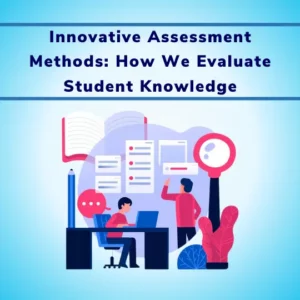Article Contents
Introduction
The use of generative AI is gaining popularity worldwide. Launches of chatbots, open AI, Google Bard, Google Vertex AI, and Amazon AWS generative AI services have been the most searched recently.
Generative AI is being used in the education industry, data science, content creation, coding, article writing, proofreading, and data science.
By 2024, the education sector will have undergone significant change in addition. Automation of educational procedures, like admissions, administration, exam management, student evaluation, and tailored assessments, is certain to come from the use of generative AI.
What is generative AI and its significance?
One branch of AI, named “Generative AI,” is concerned with teaching machines to create unique and imaginative material. Generative AI can gain knowledge from data and produce content on its own, contrary to classical AI, which follows preset rules.
With the use of algorithms and networks, this technology recognizes patterns and generates results that resemble the creative abilities of humans.
The potential of generative AI to completely transform education sectors makes it significant. Generative AI techniques are opening doors to increased productivity, creativity, and innovation in various fields, like software development and content creation.
Organizations are using these tools more and more to improve productivity, cut down on human labour, and open up formerly unthinkable opportunities.
Adaptive artificial intelligence customizes educational resources to suit each student’s interests, pace, abilities, and style of learning. It provides prompt feedback and assistance, enhancing learning effectiveness. This flexible approach addresses a diverse collection of needs, including those of students with disabilities.
Both educators and learners have the potential to leverage generative AI tools in their work, giving quick access to a large amount of information, and supporting learners of all abilities, languages, or accessibility requirements.
Students may consider using Generative AI for
- Boost efficiency in handling educational tasks
- Supplement their studies
- Generate ideas for group thinking
- Request an in-depth explanation of a subject taught in class
- Sharpen writing skills
- Receive immediate feedback
- Refine language skills
Teachers can use generative AI for
- A virtual assistant to teachers in their absence to offer guidance, provide clarification and answer questions from students.
- Generate course and content materials like question banks, lesson plans, sample papers, writing scenarios, sums, and quiz questions.
- Aid in research tasks by analyzing large datasets, identifying patterns, and generating insights and research directions.
- Draft learning objectives, course descriptions, syllabi statements, or course policies.
Some Generative AI Tools to Explore in 2024
The capacity of generative AI tools to produce unique outputs, imitate human behaviours, and create content has made them more well-known. The writing of code is changing due to generative AI.
It helps developers by producing code snippets, enhancing software testing by finding about 30% more errors, and even making recommendations for the best ways to solve coding problems. Higher code quality and quicker development cycles are the outcomes of these characteristics. Let’s learn about some of them-
Automated Video Creation for learning
Learning videos created automatically have emerged as a potent instrument in the classroom, revolutionizing conventional instruction and improving student outcomes.
Several cutting-edge platforms use generative AI and other technologies to streamline the video production process and increase accessibility for content creators and educators.
1. Wibbitz
Wibbitz is an automated tool for creating videos that accelerate production through the provision of numerous helpful templates and one-click fixes. Wibbitz gives customers access to full-spectrum colour palettes, text overlays, video intros and outros, and brand watermarks.
With the help of this automated video creation technology, you can turn your greatest videos into powerful social media content to increase your reach.
2. Adobe
Efficiency is Adobe’s top concern when it comes to video development. They help consumers save time and effort during editing by utilizing AI technology.
Among the more intriguing capabilities is auto reframing, which allows Adobe to automatically reframe a widescreen video’s subject when exporting it to social media.
In addition, their AI uses colour match, which modifies the colour and brightness characteristics of your material according to a personalized reference point.
They aren’t simply pasting a particular colour reference point onto your clips, to be clear. Rather, each chosen clip is examined by the AI, which then modifies it until it exactly matches your reference point.
3. Synthesia
The ability to create lifelike films using text inputs makes Synthesia AI revolutionary in the content creation space. It converts knowledge into captivating visual experiences by skillfully fusing text with realistic pictures using cutting-edge deep learning techniques.
This technology is changing the way we communicate and visualize ideas. It is used in marketing, entertainment, and education.
This AI-powered tool effectively turns text into videos. It produces dynamic scenes, avatars, and graphics. Video messages that are customized and tutorials can be created by content developers.
4. Murf AI
The main focus of the buzz around generative AI technologies has been their capacity to produce original writing and visuals. Yet Murf is a unique AI technology that uses text cues to produce lifelike voiceovers. It can produce voiceovers of the highest calibre for movies, slideshows, and much more.
More than 120 voices that sound human are included in Murf AI. It implies that you can create new voiceovers as often as necessary with this program. You may use these 120 voices to produce voiceovers that will help you engage your target audience because they are accessible in more than 20 languages.
You can create voiceovers for podcasts, YouTube videos, audiobooks, advertisements, and more using this AI tool. Last but not least, Murf allows you to clone your voice for personalized voiceovers.
Question Bank Creation using Generative AI
Building a solid question bank is crucial for efficient evaluations and learning objectives in the field of education. Generative AI can automatically create a varied set of questions for a range of themes and difficulty levels.
As reported by EdWeek, approximately 50% of teachers incorporate generative AI into their lesson planning, utilizing it for tasks such as gathering background information and generating engaging class ideas.
1. Eklavvya
With the aid of the cutting-edge AI capabilities of the Eklavvya platform, you can quickly and simply develop a comprehensive question bank for any topic by asking questions.
You can modify your questions with Eklavvya to meet your unique requirements and criteria, making sure your evaluations are appropriate for the job.
It saves time by automatically generating questions for you instead of requiring manual creation. It ensures a high-quality question bank through AI generation and fine-tuning by subject matter experts.
It also provides quality verification checking to ensure the question bank is of high quality. It helps to improve the assessments by ensuring their relevance to the target audience.
With Eklavvya, you get
- Instant question generator with AI that saves your time and effort
- Reduced reliance on experts on subject matter
- Customizable questions for specific assessments
- User-friendly platform
- Seamless experience in question creation
- Wide coverage for versatile and any topic
- Precision and accuracy
- Effortless transition, eliminating manual question creation hassles

2. Quizizz
Quizizz is a dynamic platform that makes use of generative AI to make it simple for educators to produce interesting tests. It’s very helpful for gamified learning environments and formative evaluations.
Considering the variety of question formats, Quizizz’s AI makes a set of recommendations for a collection of questions depending on the selected topic. The platform uses artificial intelligence (AI) to modify the difficulty of questions based on each learner’s performance, adjusting to their speed.
Instructors select one or more quiz subjects. Teachers and students get immediate feedback, which makes it possible to identify areas for growth and areas for strength in real time.
3. Canvas Question Bank Generator
The goal of the Canvas Question Bank Generator is to make it easier and better for teachers to create question banks. This tool uses generative AI to optimize questions’ visual and content characteristics, and it is tailored for a wide range of disciplines and educational levels.
It stands out in the field of educational technology thanks to the smooth transition between design and functionality.
It is a useful tool for making quizzes that look good. Canvas generative AI makes questions appear more professional and captivating by optimizing their visual presentation. Generative AI is revolutionizing the method of creating question banks in education.
These solutions save teachers time and provide a varied range of tests for pupils by automating the creation of questions and providing customization possibilities.
Generative AI Assessment
Assessment tools are increasingly using generative AI to generate tailored and varied questions, adjust to each learner’s unique route, and expedite the grading process.
1. Generative AI Assessment using Eklavvya
The term “generative AI” in assessment refers to the process of creating questions, answers, or even full assessments using algorithms trained on artificial intelligence. With the use of Eklavvya’s technology, examinations can become more effective, diverse, and adaptable, which will benefit both teachers and students.
Based on the parameters entered into the Eklavvya platform, the system generates questions using generative AI algorithms. Natural language processing (NLP) may be used in this to comprehend context and provide pertinent questions.
Every time, you’ll receive a distinct, customized assessment experience because the AI customizes the questions for the subject you’ve selected. The assessment’s conversational format, which resembles a real tutoring session, keeps users interested and engaged the entire time.
Generative AI for Viva Exam Simplification
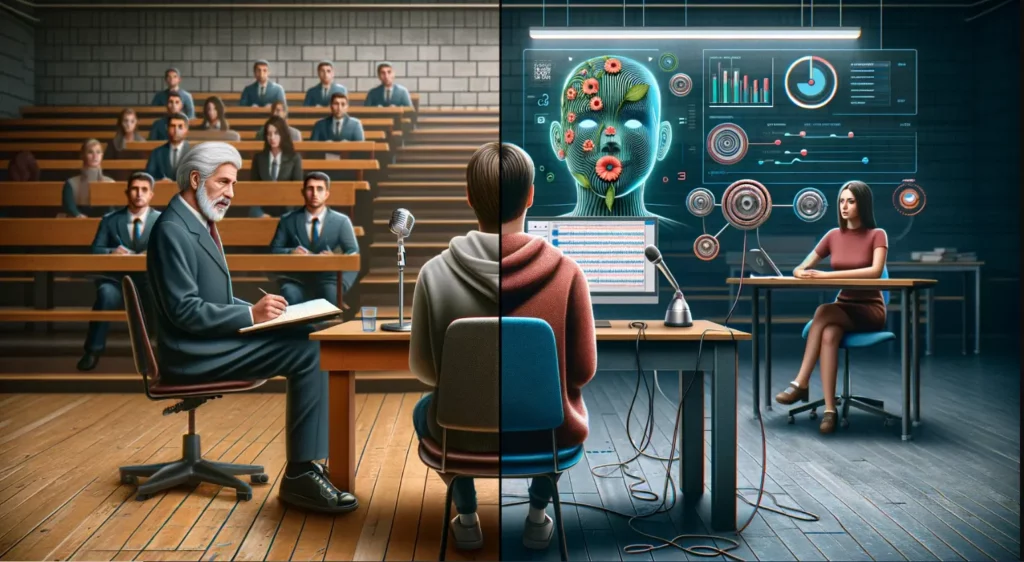
Viva or oral exams are a big part of how we test knowledge. In these exams, an examiner asks students questions, and students have to answer them.
The examiner then decides how well the student did. But there’s a problem: this way of testing isn’t easy to do with lots of students. You need many examiners, and sometimes, they might be a bit biased in their judgement.
Here’s where Generative AI comes in as a transformative tool.
Imagine a system where students can record their answers instead of speaking to a human examiner. These recordings go to a Generative AI system.
What does this AI do?
It listens to the students’ answers and checks how well they understand the topic. It looks at their technical skills and other important things that we decide are important. Then, the AI gives each student a unique rating or feedback.
This method is helpful because it makes testing lots of students much easier and fairer. With Generative AI, we can see how good students are at communicating, how much they know about their subject, and how well they solve problems.
This way, oral exams become less about who is examining and more about what the student knows and can do.
This is how Generative AI can simplify and improve Viva or oral exams. The same technology can also be used to manage the Generative AI-based interview process as well.
What are the benefits of using Eklavvya Generative AI Assessment?
i. Focused Assessment
Eklavya’s generative AI allows precise topic definition for targeted evaluation.
ii. Adaptive Engagement
Tailored follow-up questions deepen understanding and assess problem-solving skills.
iii. Personalized Experience
AI customizes questions, ensuring a unique and engaging assessment each time.
iv. Thorough Understanding
Follow-up questions promote a comprehensive grasp of the topic.
v. Instant Evaluation
Immediate AI-generated results provide quick feedback on performance.
vi. Dynamic Learning
Evolving questions create a dynamic environment, surpassing traditional assessments.

2. Eklavvya AI
Eklavvya.ai offers invaluable support for exam preparation. Designed with a focus on aiding users to gear up for various competitive examinations, this online resource facilitates the practice of mock tests for various competitive exams.
Through eklavvya.ai, students have the opportunity to engage in comprehensive practice sessions that mirror the rigour and structure of actual competitive exams.
Leveraging AI technology, eklavvya.ai customizes questions to align with specific exam syllabi, offering a simulation of real exam conditions. This feature enables learners to engage in targeted practice with mock tests that are indicative of the actual exam format.
Furthermore, eklavvya.ai provides a detailed analysis of users’ performance, broken down by topics and chapters. This analytical approach not only deepens understanding of the subject matter but also highlights areas for improvement.
Eklavvya.ai’s platform is adept at tracking and comparing performances across various assessments, allowing users to monitor their advancement in specific subjects, topics, and subtopics. It also offers insights into time management and question accuracy, critical components of exam success.
Featuring modes such as test, live mock test, and practice, eklavvya.ai tailors the learning experience to fit the needs of its users. Especially noteworthy is the practice mode, which supplies thorough explanations for each question, thus significantly streamlining the study process. Overall, eklavvya.ai emerges as an essential tool for efficient and effective exam preparation, revolutionizing the way learners approach their studies.
3. ChatGPT
The dynamic language model ChatGPT, developed by OpenAI, is renowned for its exceptional capacity to generate realistic text. ChatGPT is incredibly versatile, with a talent for creating organic dialogues, answering questions, and supporting creative writing.
This invention is gaining traction in a variety of industries, including customer care bots, content development, and author brainstorming. Its natural language proficiency is a benefit that is continuously improved with upgrades.
However, problems include the possibility of prejudice and false information, as well as the inability to fully understand complex contextual subtleties.
ChatGPT’s capacity to generate conversational content makes it a highly sought-after technology. It can produce imaginative and engaging writing that facilitates audience engagement for a business. ChatGPT is renowned for its precisely generated responses in addition to its organically written sentences.
ChatGPT was a free tool available to all users up until this point. However, ChatGPT’s designers recently revealed ChatGPT Plus, which will only be accessible with a subscription. A qualified ChatGPT developer can be hired to include this AI tool in your system.
According to a survey by Best Colleges Across the Pond, less than half (43%) of 1,000 college students acknowledge using AI in their studies. Among those who do use AI, half explicitly use it to complete assignments or exams rather than solely for information gathering.
Automated descriptive answer evaluation
Efficient evaluation is very important in education. Eklavvya’s AI answer checking helps quickly check answers, reducing the time to grade from months to minutes. The system is fair because it does not have feelings that could affect grading. It recognizes the scoring rules and gets over 90% right.
This changes how assessments are done. Schools can grade faster while still being correct. It makes the testing process better organized and allows for more frequent tests. Students get faster feedback to help them learn better.

AI Virtual Mentor for student
AI virtual mentors for students are essential in helping them throughout their academic journeys by offering individualized advice, support, and help.
These online mentors use artificial intelligence to recognize each student’s unique learning style, provide individualised guidance, and support both academic and personal growth.
1. Knewton
Knewton, a pioneer in adaptive learning technology, was founded in 2008. Its artificial intelligence (AI) algorithms assess pupil performance and provide customized assignment and topic recommendations.
Its Alta program assists teachers in teaching a variety of courses at different educational levels, including biology, mathematics, psychology, and more. Knewton has worked with elearning app development companies and universities to enable tailored learning for students worldwide, improving their academic performance.
2. Cognii
An AI tool named Cognii is adept at evaluating and offering comments on written responses. In educational settings, it is frequently employed to assess and mentor students in subjects like writing, critical thinking, and problem-solving.
Leading artificial intelligence-based solutions for professional training and education app development are offered by Cognii Inc., a leader in the educational technology industry.
The organization has collaborated with many K–12 and corporate training groups to provide more cost-effective and efficient learning solutions.
The company’s Cognii Virtual Learning Assistant is an ed-tech solution that has won awards and offers personalized learning, intelligent teaching, and open responses.
Through the use of virtual learning assistants and conversational technologies, students are assisted in providing open-ended answers that enhance their critical-thinking skills.
3. Kidaptive
Kidaptive’s adaptive learning technology creates a personalized learning path based on the learner’s interests and talents. This game-based learning company keeps track of learners’ behaviours over time and reports on success to parents, teachers, or students.
Kidaptive was recognized for excellence in mind-building with awards from Academics’ Choice, Startup World San Francisco 2013, and LAUNCH Edu 2013.
The ALP platform uses AI to present and challenge students most effectively based on each person’s estimated skills and weaknesses. Future academic accomplishments can also be predicted by the platform based on underlying patterns and relationships.
4. Thinkster Math
Thinkster Arithmetic, a firm formed in 2012, combines AI-driven, personalized arithmetic training with human coaching. The platform offers K–8 math programs that may be tailored to each learner’s preferred pace and style of learning.
With the use of technology, students are guided through their work step-by-step and given explanations for correct responses or areas for growth.
Thinkster Math’s innovative approach is being adopted by more parents who wish to supplement their child’s education app development company with personalized, data-driven math instruction.
Conclusion
Generative AI is going to assist the education sector with the automation and simplification of various processes.
It is going to change the way the examination process, question paper generation, and elearning video making is done.
Education institutions must adopt and explore those Generative AI tools and integrate it with existing systems to stay ahead of the competition.


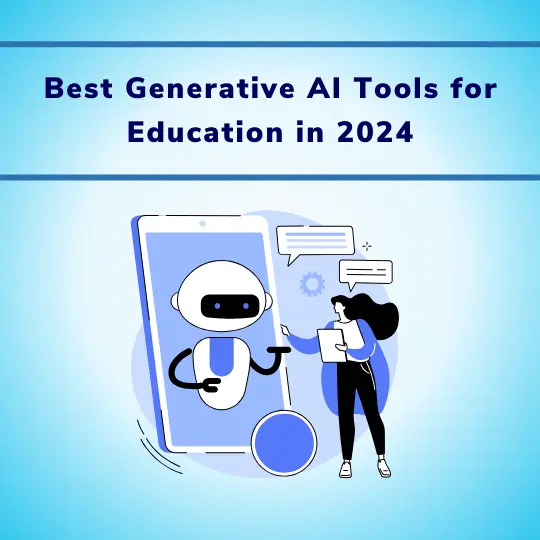

![How Government-Led Exams at 250+ Locations Are Setting New Standards of Integrity [Case Study]](https://www.eklavvya.com/blog/wp-content/uploads/2024/04/Enhancing-Exam-Integrity-Government-Certification-in-250-Locations-150x150.webp)
![Transforming Central Govt. Exams Evaluation: How Onscreen Marking is Leading the Charge [Case Study]](https://www.eklavvya.com/blog/wp-content/uploads/2024/04/How-Onscreen-Marking-Revolutionized-Central-Govt-Exams-Case-Study-1-150x150.webp)
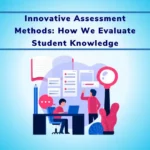
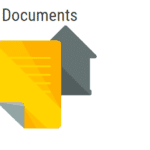

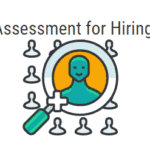









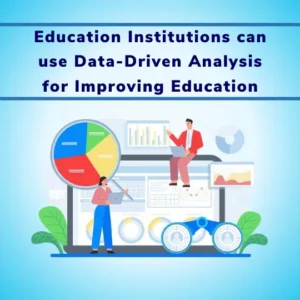

![How Onscreen Marking Revolutionized Central Govt Exams [Case Study]](https://www.eklavvya.com/blog/wp-content/uploads/2024/04/How-Onscreen-Marking-Revolutionized-Central-Govt-Exams-Case-Study-1-300x300.webp)
